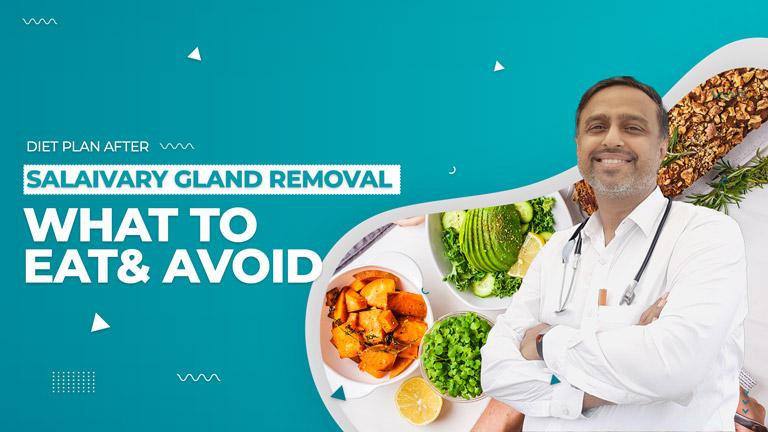Creating a suitable diet plan after salivary gland surgery is essential to ensure a smooth recovery while minimizing discomfort and complications. The surgery might temporarily affect your ability to chew and swallow, so it’s important to choose foods that are easy to eat and provide the necessary nutrients for healing.
The process of treating cancer through salivary gland removal surgery can impact your eating habits such as dry mouth, lost taste, chewing difficulty, and weight problems. However, today we have come up with the diet plan to follow after salival gland removal surgery and strategies available to help you manage this challenge more effectively.
What can I eat just after Salivary Gland Removal Surgery?
On the day of surgery, post salivary gland surgery you can start with your normal diet that your dietician or surgeon has provided. Maximize fluid intake and low-fat food to avoid any complications further. Consult your doctor if you notice irregular bowel movements and any stomach problems.
Foods to eat after salivary gland surgery
Soft Foods: Opt for soft, easily chewable foods that require minimal effort to consume, such as mashed potatoes, pureed soups, apple sauce, yogurt, cottage cheese, smoothies, etc.
Protein Sources: Protein is crucial for tissue repair. Choose lean, tender protein sources such as cooked and soft meats (chicken, turkey, fish), eggs (scrambled or boiled), paneer, greek yogurt.
Healthy Fats: Incorporate healthy fats such avocado, nut butters (peanut, almond), they provide energy and support healing.
Cooked Vegetables: Soft-cooked or steamed vegetables such as carrots, zucchini, spinach, and broccoli, are easier to chew and swallow.
Grains: Choose easily digestible grains such as cooked rice, pasta, soft bread, oatmeal, etc.
Hydration: Staying hydrated is crucial for healing. Sip on water, herbal teas, or diluted juices throughout the day.
Fruits: Opt for ripe, soft fruits that are easy to chew such as bananas, peaches, melons and berries.
Foods to avoid after salivary gland surgery
Hard, Crunchy Foods: Avoid foods that can be difficult to chew and may irritate the surgical site such as raw vegetables, nuts and seeds, hard fruits (apples, pears)
Spicy and Acidic Foods: citrus fruits or juices and tomato-based sauces can potentially cause discomfort or irritation in the mouth.
Sticky Foods: Foods that stick to dental work or the surgical site can be problematic such as sticky or chewy candies.
Tough Meats: Hard-to-chew meats such as steak, pork chops and tough cuts of meat can strain the healing process:
Alcohol and Caffeine: It’s best to limit their consumption as these substances can contribute to dehydration.
Crunchy Snacks: Snacks like chips and popcorn can be difficult to eat and may irritate the surgical site.
Diet to follow post-salivary gland removal surgery
Everyone’s recovery and dietary needs vary, so it’s crucial to take a healthcare provider’s advice before switching to any diet plan. Our expert dietician has made the below-mentioned sample diet plan, for reference;
Breakfast:
- Scrambled eggs or soft-boiled eggs
- Oatmeal or cream of wheat (cooked to a smooth consistency)
- Mild fruit smoothie (avoid citrus fruits) or yogurt
- Herbal tea or water
- Morning Snack:
- Cottage cheese or
- Greek yogurt (avoid added fruits with seeds)
- Applesauce or mashed banana
Lunch:
- Creamy soup (pureed or well-blended) such as potato, butternut squash, or tomato (strained)
- Soft rice or well-cooked pasta
- Steamed or well-cooked vegetables (e.g., carrots, zucchini)
- Herbal tea or water
Afternoon Snack:
- Smooth nut butter (peanut, almond) on soft bread or crackers
- Soft fruit (e.g., ripe pear, peach) without skin or seeds
Dinner:
- Baked or steamed fish (avoid bones) or tender cooked chicken
- Mashed potatoes or cauliflower
- Steamed and well-cooked vegetables
- Herbal tea or water
Evening Snack:
- Pudding or custard (avoid seeds or tough textures)
- Rice pudding or tapioca
Hydration: Sip water throughout the day.
Avoid very hot or very cold beverages, as extreme temperatures might be uncomfortable.
NOTE: As you progress in your recovery, you can gradually reintroduce more textures and solid foods, based on your doctor’s recommendations.
Wrap-up Tips on Post salivary gland surgery diet:
Remember to consult with your healthcare provider or a registered dietitian before making any significant dietary changes after surgery. They can provide personalized guidance based on your medical condition, recovery progress, and nutritional needs. If you have any concerns about your diet or are unsure about certain foods, don’t hesitate to consult some highly experienced laparoscopic surgeons such as Dr. Sunil Tibrewal.






